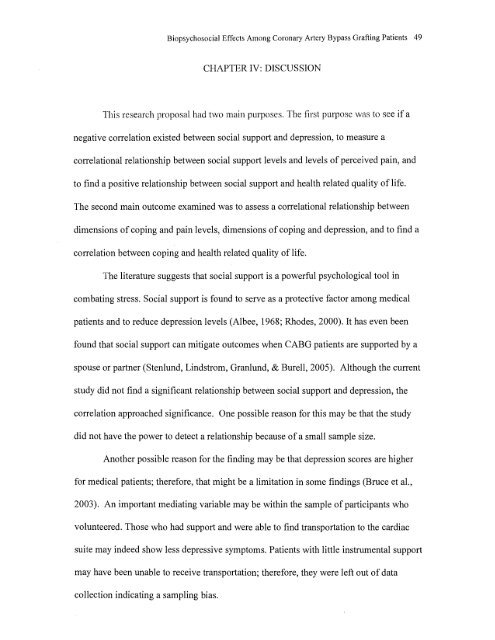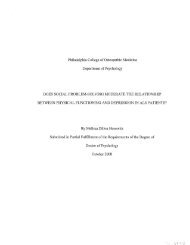0 - Philadelphia College of Osteopathic Medicine
0 - Philadelphia College of Osteopathic Medicine
0 - Philadelphia College of Osteopathic Medicine
You also want an ePaper? Increase the reach of your titles
YUMPU automatically turns print PDFs into web optimized ePapers that Google loves.
Biopsychosocial Effects Among Coronary Artery Bypass Grafting Patients 49<br />
CHAPTER IV: DISCUSSION<br />
This research proposal had two main Pl11110ses. The first purpose was to see if a<br />
negative correlation existed between social support and depression, to measure a<br />
correlational relationship between social support levels and levels <strong>of</strong> perceived pain, and<br />
to find a positive relationship between social support and health related quality <strong>of</strong> life.<br />
The second main outcome examined was to assess a correlational relationship between<br />
dimensions <strong>of</strong>coping and pain levels, dimensions <strong>of</strong> coping and depression, and to find a<br />
correlation between coping and health related quality <strong>of</strong> life.<br />
The literature suggests that social support is a powerful psychological tool in<br />
combating stress. Social support is found to serve as a protective factor among medical<br />
patients and to reduce depression levels (Albee, 1968; Rhodes, 2000). It has even been<br />
found that social support can mitigate outcomes when CABG patients are supported by a<br />
spouse or partner (Stenlund, Lindstrom, Granlund, & Burell, 2005). Although the current<br />
study did not find a significant relationship between social support and depression, the<br />
correlation approached significance. One possible reason for this may be that the study<br />
did not have the power to detect a relationship because <strong>of</strong> a small sample size.<br />
Another possible reason for the finding may be that depression scores are higher<br />
for medical patients; therefore, that might be a limitation in some findings (Bruce et aI.,<br />
2003). An important mediating variable may be within the sample <strong>of</strong>participants who<br />
volunteered. Those who had support and were able to find transportation to the cardiac<br />
suite may indeed show less depressive symptoms. Patients with little instrumental support<br />
may have been unable to receive transportation; therefore, they were left out <strong>of</strong> data<br />
collection indicating a sampling bias.






